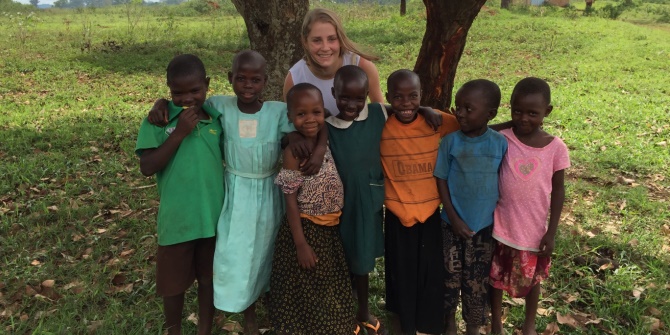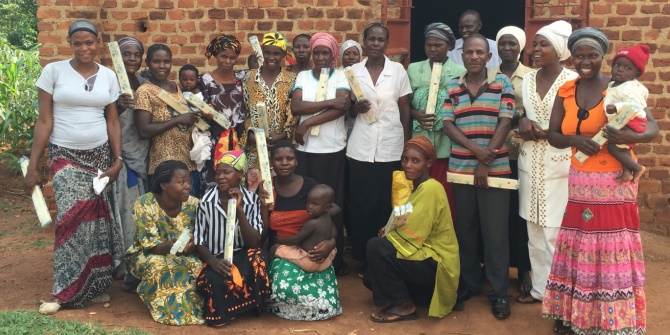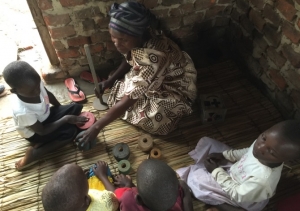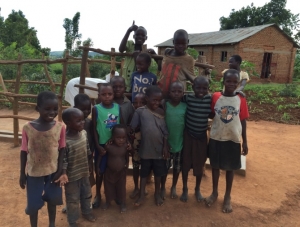
A couple of months ago, I wrote a blog entry on the LSE Careers site about my experience volunteering for Lively Minds in Uganda, particularly about what led me to volunteer and why.
Now, I can succintly say that by choosing to volunteer in an organisation like Lively Minds I was able to witness how improving early childhood care and education in Uganda, through community-run Play Schemes for rural children aged 3-6, can make a massive difference.
When I arrived in Uganda, little did I know of this country, or Churchill’s “Pearl of Africa”. A few history lessons had (un)fortunately taught me about Idi Amin Dada’s brutal dictatorship and the Lord Resistance Army’s (LRA) atrocities. Nonetheless, and although I was privileged to reconnoiter the beauties, splendours and all the positive surprises this country has to offer, I witnessed first-hand some distressing situations.
The first one being the educational conditions in Uganda; there is no state-funded school pre-primary provision. Worryingly, there is a crisis of early grade reading, a national primary completion rate of just 54% with children in rural communities being the most under-served. In fact, despite the $302m spent annually on primary education, almost 70% of children are likely to drop out, with hidden costs proving too high for poorer parents.
I was encouraged by what I saw at Lively Minds. And the results speak for themselves – ‘Volunteer Mothers’ who are able to commit to running Play Schemes on a voluntary basis –hence contributing to making the project sustainable—dramatically improve the school-readiness of the children and the wellbeing of the Mothers.
The importance of the aforementioned lies primarily in those children who receive quality care and education in their early years are proven to have better health, do better and stay longer in school, and have better economic trajectories in adult life. In the rural villages I visited, people do not receive these vital opportunities. There are no pre-schools and most parents are poorly educated, nor have they been taught simple childcare practices or ways to stimulate learning. As poverty is all they have known, with great frequency, they have low aspirations for themselves and their children. At the same time, these challenges lead to poor health, poor education, lost life opportunities and poverty.

For this reason, Lively Minds targets the poorest and most remote rural communities where most families live on less than US$2 per day –implausible for many, but true! These communities are generally overlooked and under-served by both governmental and civil society organisations. As proof of this, most of the women I worked with did not complete primary school and understandably their literacy levels were very low.

Lively Minds targets the poorest rural communities to run Play Schemes and to provide better care at home. The ‘Volunteer Mothers’ are trained and empowered to run the Play Schemes on a voluntary basis, using games made from cheap local materials. To reinforce new behaviours and keep mothers committed to volunteering, they are monitored regularly and are given monthly capacity-building workshops on parenting, health and life skills topics. Each lesson is carefully designed, using behaviour-change principles, helping mothers to recognise the importance of changing their practices and giving them practical ways to take action using local resources.
The second situation I was appalled to see related to health. Albeit record investment over the past years, Uganda’s healthcare performance is still ranked as one of the worst in the world by the WHO; the country is ranked 186th out of 191 nations. Additionally, a Ugandan’s health and life expectancy is among the lowest across the globe. Nonetheless, I had recently read that Nudge theory [could] now be used to fight malnutrition and open defecation among other common diseases like diarrhea which kills 2,195 children every day—more than AIDS, malaria, and measles combined.
Encouragingly, Lively Minds seemed to be working in the right direction; by using a behaviour-change approach to build the capacities and to transform the mindsets of the mothers to obtain the knowledge, skills and drive to give their children a better start in life and better chances for the future, using their own resources.
 For example, children have to wash their hands with soap or ash at the start of every Play Scheme session, habituating them to this vital practice. Mothers are taught how to make simple hand washing devices (tippy-taps) at home and are given a series of health and hygiene training sessions, including disease prevention, nutrition and home hygiene, as part of the syllabus of monthly workshops.
For example, children have to wash their hands with soap or ash at the start of every Play Scheme session, habituating them to this vital practice. Mothers are taught how to make simple hand washing devices (tippy-taps) at home and are given a series of health and hygiene training sessions, including disease prevention, nutrition and home hygiene, as part of the syllabus of monthly workshops.
A ‘Volunteer Mother’ at the Igombe village said:
“Before [the] Lively Minds project, we didn’t consider washing hands with soap after coming from the toilet as an important practice… Now, all my children wash their hands with soap after coming from the toilet. We sometimes run out of soap and when this occurs, we use leaves from pumpkin plants and paw-paw trees to ensure that this habit is continued.”
This reflects that one of the key barriers to healthy child development is that deprived rural mothers lack the information and skills to provide their children with the education and care they need to fulfil their full developmental potential.
In short, the above are just two cases where Uganda unfortunately faces struggles.
Finally, I greatly enjoyed my experience but I mainly partook in this project because of its sustainable character. As I had mentioned in my previous blog entry, for me, finding the right organisation to go abroad to was essential. Lively Minds proved so; it is holistic, activity and community based, it uses local resources, promotes capacity-building, and very importantly is wide-reaching and scalable. Some positive facts relating to the Lively Minds project in Uganda include:
- A 108% increase in assessment results after 6 months in improved school readiness assessment scores in children.
- Reductions in childhood disease rates, 46% in diarrhoea and 35% in malaria after 6 months.
- An improvement in rates of play and stimulation at home showed a 110% increase after 6 months.
If you would like to find out more information, please watch https://vimeo.com/124813758
 Susana Rubinstein graduated in the LSE Master of Public Administration Class of 2016. Susana was nominated for the LSE Volunteer of the Year award due to her work with Lively Minds in Uganda.
Susana Rubinstein graduated in the LSE Master of Public Administration Class of 2016. Susana was nominated for the LSE Volunteer of the Year award due to her work with Lively Minds in Uganda.






Great article and great work in Uganda. Thanks Suzan!